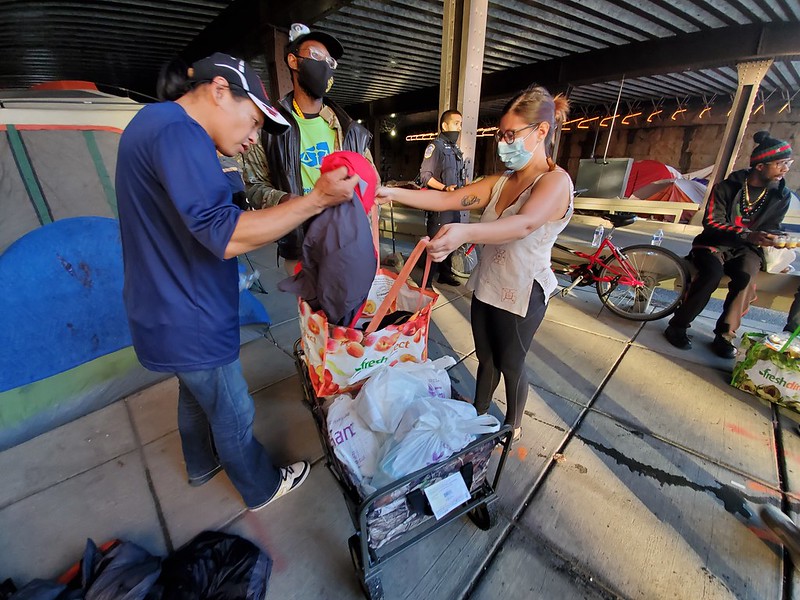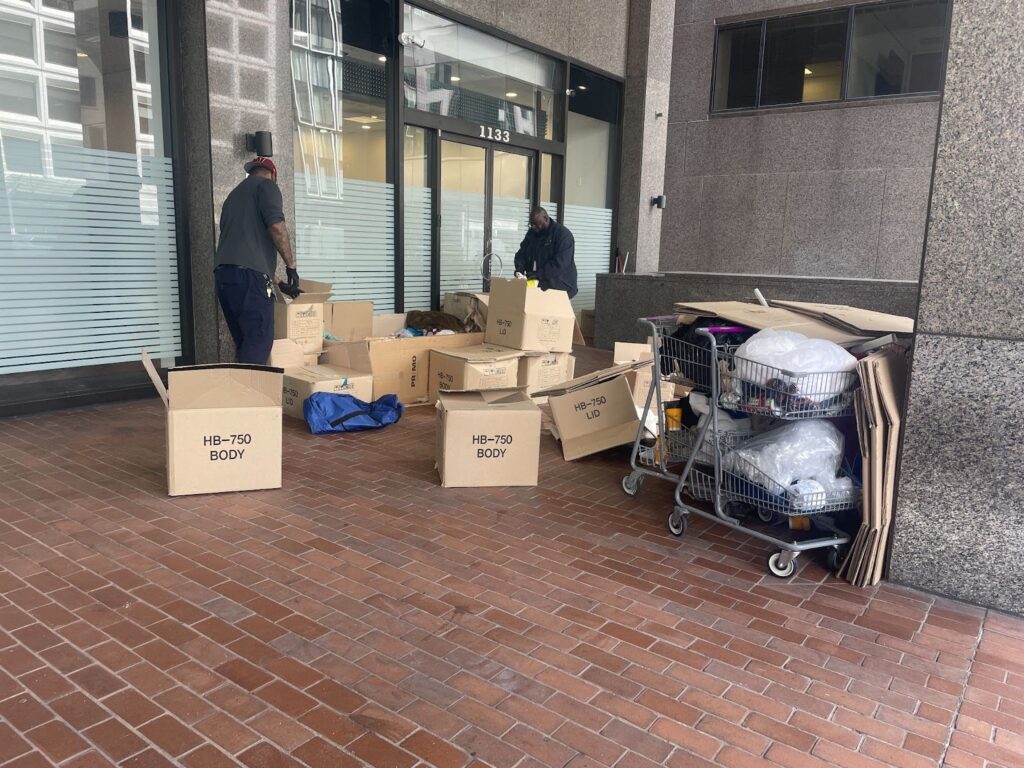With D.C.’s homeless community experiencing both the pandemic and hypothermia season at once, nonprofits are strengthening efforts to bring aid to these communities.
Staff and volunteers from nonprofit aid groups the People for Fairness Coalition (PFFC), Ward 6 Mutual Aid and the Gonzaga Peace Club were out in NoMa packing and distributing food, water and hygiene products to the neighborhood’s homeless community. Street Sense Media live tweeted the distribution on Nov. 8, 2020.
I’m here with the People for Fairness Coalition (@WashDCPFFC311) and Ward 6 Mutual Aid (@ServeYourCityDC) packing up food, toiletries and other essential items to distribute to the homeless community in Ward 6. @streetsensedc #homelessness pic.twitter.com/uP2PSpnlt8
— Athiyah Azeem (@AthiyahTA) November 8, 2020
The organizations have been distributing multiple days a week since late May. With hypothermia season activated from Nov. 1 until March 31, they are now offering sweaters, blankets and other warm clothing to homeless communities in the area. The nonprofits receive most of their items through donations, and PFFC uses money from grants received from the Diverse City Fund and COVID-19 Rapid Response Program to buy more resources.
PFFC is a nonprofit that aims to end housing instability in D.C. through advocacy and outreach. Advocacy Director Reginald Black, who is also an artist and vendor for Street Sense Media, says the organization usually addresses “advanced needs” like addressing obstacles to getting people housing, and creating and advocating programs to end homelessness.
“But due to the pandemic, we see that unhoused people need things like baby wipes and hand sanitizer to keep them safe,” Black said. PFFC does these distributions four days a week, from Thursday to Sunday.
PFFC was formed in 2008, and is led by founder and current director Robert Warren, also a Street Sense Media artist and vendor. The coalition has been reaching out to homeless communities across D.C. for 12 years.
“We were doing outreach to this homeless community before the pandemic,” Warren said. “And so we felt an obligation to make sure that we’re out here, and making sure that we’re advocating on behalf of them.”
Ward 6 Mutual Aid was created in May in response to the pandemic’s effect on marginalized communities in Ward 6. They distribute food, water, hygiene products like toilet paper and masks to encampments across D.C. on Thursdays, Fridays and Sundays.
On Sundays, the nonprofits distribute in the NoMa neighborhood, mostly to large encampments on L and M streets NW and by Union Market.

Momma J is a woman experiencing homelessness who has been living on L Street NW since 2012. She says that as the city does not provide consistent help to the homeless community in the pandemic, she has come to rely on the nonprofits to provide her hygiene products.
“Could you imagine going to the bathroom and having nothing to wipe with?” J said. “They make sure on Sundays, we get a pack of baby wipes and a roll of toilet paper.”

Ricky McNill has been living in an encampment on M Street NW for a year and has been experiencing homelessness for two years. He appreciates the help the nonprofits provide, but is disappointed at how much housing assistance from the D.C. government has been slowed due to the pandemic.
“Things are at a standstill, at a snail’s pace,” McNill said. “The Mayor needs to be more proactive and understanding when it comes to the needs of the homeless.”
Warren is from Washington D.C. He says he remembers when NoMa was largely an open space, home to poor communities in D.C. Now, there are rows of modern apartments with high rent prices.
“A lot of what they have built, wasn’t built for the residents who live in NoMa,” Warren said. The average rent for an apartment in the NoMa-Galludet area is $2404 per month, 8% higher than the Washington D.C. average, according to the rent-analytics website RentCafe. Warren believes this gentrification forced local residents to relocate and put more people on the streets.

Along with food and hygiene products, volunteers slip in flyers that explain PFFC’s Vacant to Virus Reduction program (V2VR), where the organization intends to house people experiencing homelessness in 10,000 vacant units found in 3000 buildings across D.C.
“About a third of those or so are actually Class A, which will be like the luxury units you see over here in Union Market,” Black said.

Students from the Gonzaga Peace Club, an advocacy group based in Gonzaga College High School, also participate in distributions. Henry Sullivan was the club’s president in March, when he and other members testified to the D.C. Council Committee on Health to ask to stop evictions of homeless communities on K, L and M streets.
At the start of the pandemic the Centers for Disease Control advised against clearing encampments, but the DC Department of Health and Human Services continued to clear encampments as recently as Nov. 10, conducting a “full cleanup” on New York Avenue and Montana Avenue, according to their website.
Sullivan has now graduated, and is pursuing a degree in social work at Fordham University in New York, but he continues to help with the club’s efforts to aid homeless communities.
“Ultimately, these folks need housing,” Sullivan said, but he hopes providing hygiene products now will help protect homeless communities vulnerable to COVID-19. “This is a bandaid, really.”
Sullivan and other volunteers say they are nervous for hypothermia season. Due to COVID-19, businesses do not allow customers to dine-in, meaning people experiencing homelessness in the area are unable to stay inside stores for warmth when the weather gets colder. To address that issue, the Gonzaga Peace Club collects donations of sweaters and other warm clothing to distribute to homeless communities.
To Black, doing these distributions and other in-person outreach is integral to bringing accurate advocacy and outreach to homeless communities.
“So we want to continue this presence, so that instead of just moving these NoMa residents, they’re getting housing,” Black said.








